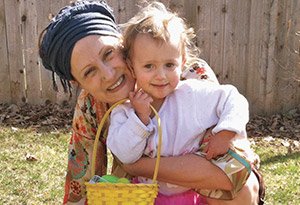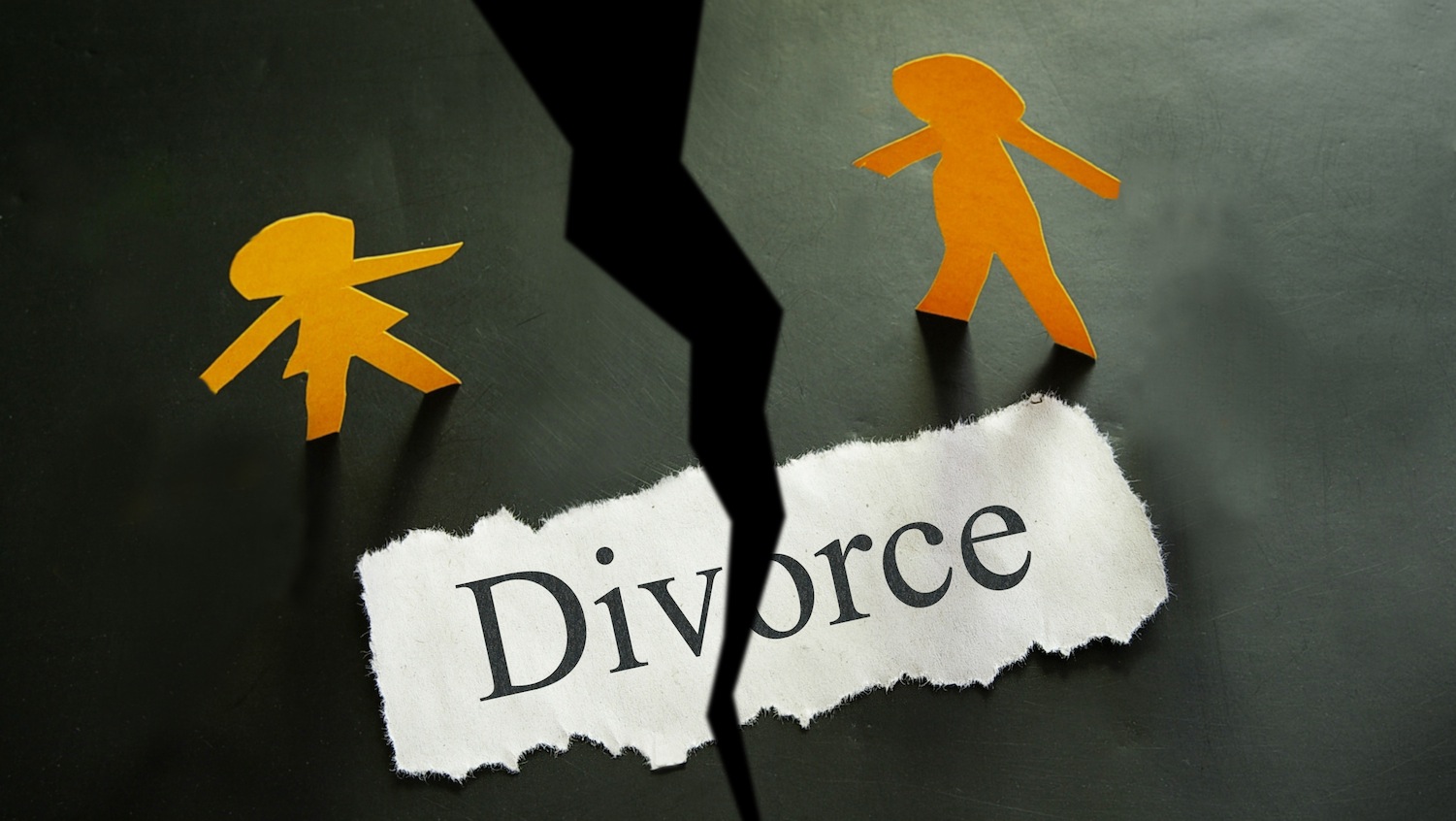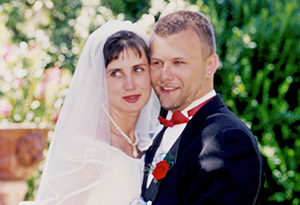Mid-divorce, my soon-to-be ex-husband and I stood teary-eyed in an airport, boarding planes bound for the separate cities housing our newly separated lives, wondering how we would “stay friends”—but actually really do it. I joked that we should have a child to guarantee lifelong contact. Four years later (jokesters, beware), we did just that, the statistically freakish result of a one-night stand.
The act itself can be blamed on the usual antecedents: a wedding, an open wine cellar, a tent. The wedding was my sister’s; my ex was invited because he was still tight with my father and because I needed a buffer from the difficult woman my father had recently married. To wit, when we arrived, we were shown not to a room in the house I grew up in, but to a tent my poor torn father had pitched outside in the yard, as if we were displaced hurricane survivors. Not to let the slight go unadvertised, I dragged an old, unmounted door from the garage and propped it against the tent, demanding that anyone wanting to speak with either T or me knock first. After the reception, T and I listed back to the tent and fell into the door, which fell into the tent, wherein we promptly forgot we weren’t married.
On the mightily hung-over ride to the airport the next day, we admitted to not feeling all that guilty. We both were seeing other people—T was living with a woman—but with an ex-spouse, it sort of seems like you’ve got a freebie coming.
A few weeks after the wedding, I started feeling sick. I went to the doctor and told her the only thing that occurred to me: “It looks like I’m in menopause, so you’ll have to give me whatever you give people for that.”
She left, came back and said that this was the opposite of menopause.
I called a friend and made her chain-smoke in my backyard while I sat downwind and cried, ankle-deep in the sun-bright leaves of a Utah fall. I was 41, a hermit-writer who slept ten to 12 hours a night, a tomboy who had held perhaps two babies, ever, regarding them as benign, ignorable life-forms on the order of cats. We talked about my options, sort of, but I understood that if this late in the game a baby was going to fall out of the sky into my unlikely lap, then I needed to do as I was told, so to speak, and have it.
When my friend left, I steeled myself and called T. His first reaction was a sound effect, the “ooouff” you hear when someone catches a hard-thrown ball in the gut. Then he said, “Okay. Let me think. We’ve got to think.”
I told him I’d already tried that, and it wasn’t helping.
“How sure are they?”
“They seem pretty sure. In the hundreds percent.”
After T, I called the guy I’d been dating before the wedding, who also could have been the father, a cheeky/dorky ordained Buddhist something or other (I thought of him as “the monk”) from a Zen sect that lets you keep all your money. The monk came around to the idea in that one phone call—and even started sounding happy about it—despite the paternity issue. “Don’t worry about that now,” he said. “Just breathe.” This is why it hadn’t worked out with us—his solicitude over things (breathing) that my body did automatically. I liked his company, though; he was calming and kind and can-do. A few weeks later, he flew out from New Jersey to accompany me to the first ultrasound.
According to the ultrasound tech, the baby’s measurements put her (her?!) at 13-ish weeks old, which would mean she’d preexisted my sister’s wedding by two weeks, thus ruling out T as the father. Together the monk and I sat absorbing this news in the genetic counselor’s office, a room so small, it seemed like a gag. We could have easily shaken the woman’s hand, left and never questioned paternity again. But as we were standing to go, I for some reason asked, “So that’s a solid date, right? Thirteen weeks?”
The doctor started to nod; then her expression wilted like someone who’s just remembered she has no friends. “Or, wait. No. It’s not necessarily solid.”
So began our adventure with the pregnancy calculator, a small cardboard disc with a central arrow like on a carnival wheel of fortune. “Without going into too much detail,” I explained, “I need to rule out one particular night as the conception date in order to know the baby is ours.”The doctor smiled down at the wheel, its arrow pointing to the day of my sister’s wedding. “But this is the likeliest day, given your cycle. I mean, really, that’s the day.”
“But that’s 11 weeks ago, not 13.”
“That’s definitely the day, though. Let me see if someone else can explain this better.”
At some point in the pageant of medical professionals who squeezed into the clown car of an office to explain how this baby could be 13 weeks old even though she’d been conceived at some point that was not 13 weeks ago, the monk and I conceded to the power of the wheel. His hand went slack in mine as he—extremely uncharacteristically—snapped at one of the doctors: “We’re not idiots. We get it.” In the parking garage, he stood by my open car window, saying, “You know I’ll always take care of you guys, right? No matter what, I’ll always be there. Tell me you know that.” I looked at him, the smudges on his glasses. I was surprised to hear him talk that way at our age.
Tryingly, it would be two more months before a prenatal paternity test could resolve the matter absolutely, months that included Christmas, New Year’s, Valentine’s Day. Until then, we just had to wait—T in San Diego, the monk in New Jersey, my rapidly expanding self in Salt Lake City. T kept his secret close, telling no one, slogging through his days in a fog of dissonance. The monk, on the other hand, showed my daughter’s ultrasound pictures to strangers in coffee shops and regularly flew back and forth between Jersey and Salt Lake to make sure, as promised, that I/we were taken care of.
When the time came, he found a genetic testing center in a strip mall, a colorless hive of cubicles where a man named Ricardo bore witness as the monk swabbed a Q-tip around his inner cheek. We had a two-week wait for the results, a time I passed in a fever of Darwinian analysis: Who would be the better father from a Petri-dish perspective? One was more athletic, the other had nicer teeth; neither could dance, but one could sing; one fidgeted, the other had a rather feminine walk; each was smart and kind, but one was more of both. Knowing me as he did, T would text me things like, “I bet you’re drooling over my genes,” and I would think, “Okay, he’s funnier; the funnier one should be the dad.” But T didn’t want children, while the monk wanted one in abundance. Were he the father, I knew, my single motherhood would be half as hard.
On the 14th day, Ricardo called and left an almost sadistically circuitous message in which, at the last possible moment, he disclosed that the monk was not a match. When I got the news, I was teaching a fiction class at the U. on the hill. We had been workshopping a monologue written from the point of view of a cow. I told my students, “Some of you are trying way too hard here. Don’t think you have to sit around making stuff up. Your normal lives are weird enough. Trust me.”
Because it seemed more urgent to deliver yes-news than no-news, I called T first. He didn’t sound surprised in the least.
I said, “Can you say something positive about all of this?”
“Of course. I’ve just got a lot to figure out, but I know she’ll be beautiful.”
“But do you want her, like, at all?”
“Of course, baby,” he said. He hadn’t called me baby in a long time, and though there was no question of our reuniting (it had taken many years and all our combined strength to get divorced), it was hard not to feel endeared toward a relationship that was apparently harder to leave than the Mafia. “Listen to me,” he said. “I’m not going to leave you hanging on this.” I knew that this was so, but I also knew that “I won’t leave you hanging” was a far cry from “I want this.” When we hung up, I realized I’d half expected him to say he’d be flying out so we could sit and plan; I thought he’d want to feel the baby kick, because that would make it real. But he hadn’t offered to do any of those things—didn’t even want to see ultrasound pictures.

Next I called the monk and told him, “It’s not the answer you want.” As I spoke, I saw myself sitting in my bungalow growing pregnanter and pregnanter without his calls, texts, pep talks and visits. I thought about the day I was walking my dogs and a guy leaned out of a slowing car and yelled, “Where’s that baby’s daddy? Why isn’t he out here walking those dogs?”
Last I called my father, who said, “Isn’t that wonderful!”
“No, Dad, it’s not. T will do what’s right, but he doesn’t want this.”
“That doesn’t matter right now. It’s the disposition that’s important.”
I sighed. “I don’t know how I made such a mess of things.”
“A mess?” he said. “Life by design is a mess. The minute you’re born, you’re dying.” I heard him puffing on a cigar. “I don’t pretend to know what drives you in this world, but you don’t apologize to nobody for nothing.”
T delayed telling his girlfriend about the baby, because they had been planning a fancy trip to Europe. “I know she’ll probably leave me,” he said sadly, “so I’d at least like to go on our trip and tell her when we get back.”
I said, “Your only shot at keeping her is to confess and then immediately propose.”
“Yeah, that’s every girl’s dream: ‘Hey, I knocked up my ex-wife. Will you marry me?'”
“It was just a one-night stand,” I said.
“A one-night stand that’s going to walk and talk and never go away.”
A week or so after they returned from Europe, he texted me at 6 A.M.: “It’s done. I told her. Don’t know how I could have hurt that girl more than I have.”
She packed up and stayed with friends for a week. Then, to everyone’s surprise, she returned, somehow willing to see what could be salvaged between them.I sat in the stripped backyard of late winter and tried to think what our futures would look like. I didn’t doubt that T would take care of the baby financially, but at this point money was the least of my worries. By nature I’m a low-energy person. When I tried to imagine even just bending to pick the baby up, I would see, as in a commercial for assisted living, a stray hand shoot to my lower back, hear a deep moan as my knees buckled. It was also becoming clear that T wouldn’t say or do anything not approved by the girlfriend he was scrambling to keep. A ground rule of their probationary reunion was that T and I never be alone together. This meant T could come to the birth only if his girlfriend came, to which—during the last two hot, bloated, bitchy, scary, sleepless months—I wrote and called, and texted, “NO.“
At semester’s end, my students finally asked about the pregnancy. They wanted to know if I would write about it. I wasn’t quite sure what to say. I was due in a few weeks, and already I felt shady in public, like everyone was looking me over, wondering who I thought I was and where exactly I’d come by this baby. I wondered these things myself. I didn’t even know when I would see T again, but since my students wanted to hear about him and since it was a writing class, I found myself telling them about our first married years, when I would follow T around our apartment with awful, horrible early drafts of stories and novels and read aloud to him during Monday Night Football commercial breaks. We both had math backgrounds and knew nothing about the stuff I was trying to write. He’d hand back a few hundred pages and say, “I can’t tell if that character’s stuck in a bathtub or a taxicab.” But he believed, or seemed to, that if I just kept going, eventually a shape would appear in the chaos.
I didn’t know, as I stood trying to explain things to my class, that a week after our daughter’s birth, T and his girlfriend would fly out to meet her. Or that by 6 months, they’d be seeing her regularly, with me flying her to San Diego and staying in a hotel or, for longer visits, turning right around and flying home on the same plane. I had no reason to believe, back then, that our funny little family would ever spend more than a few airport minutes together at a time, and certainly nothing to prepare me for the afternoon of my daughter’s second Halloween, when her father—newly broken up with his girlfriend—would spontaneously get on an airplane to take her trick-or-treating.
When my ex-brother-in-law learned we were expecting a baby, he e-mailed me: “Why am I not surprised? You guys never did anything the normal way.” This was true. Fifteen years earlier, T had asked me out over a dot-matrix printer at work; for our first date, he took me to see Blue Velvet at the Brew & View in Chicago. We sat at a wobbling cocktail table and drank Pabst Blue Ribbon and made each other laugh, and he leaned forward and smiled the way his daughter does now—the way she did that Halloween, strutting between us in a peacock costume and holding our hands, every few feet jumping into a swing, landing and looking up to confirm that we were really both there at once, together but apart, a trick and a treat.
April Wilder is the author of This Is Not an Accident: Stories. Read the full story in the February 14 Issue of Oprah Magazine where this article was originally published.








